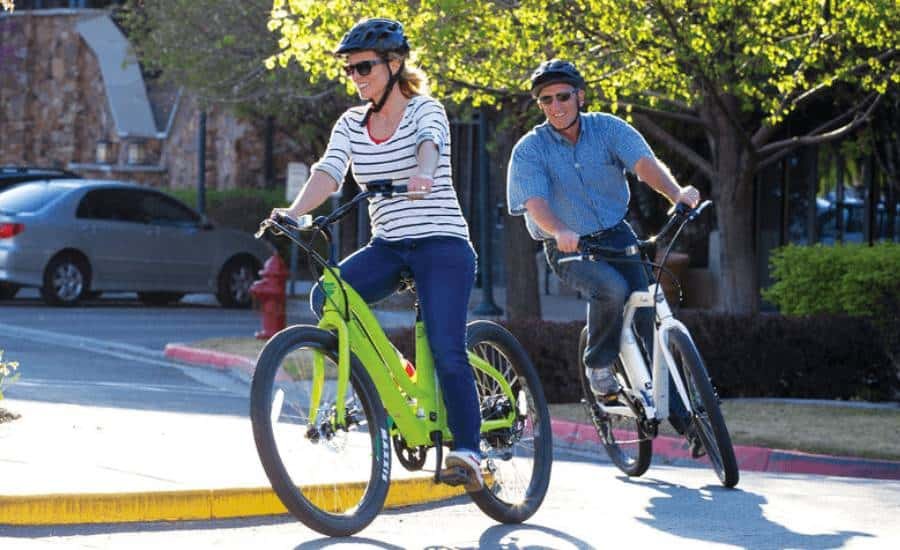Electric bikes have revolutionized the way we commute and travel. They are environmentally friendly, cost-efficient, and easy to use, making them a popular choice for many riders.
However, the legal requirements for electric bikes can be confusing, particularly when it comes to licensing and registration. In fact, a recent study found that only 22% of people in the US are aware of the laws surrounding electric bikes.
If you’re considering purchasing an electric bike, it’s essential to understand the legal framework that governs their use. In this post, we’ll provide you with an overview of the regulations surrounding electric bike licensing and registration.
We’ll also discuss the different types of electric bikes and their classification under the law. So, whether you’re a commuter, adventurer, or just looking to switch up your mode of transportation, keep reading to learn more about the legal requirements for electric bikes.
What Are the Legal Requirements for Riding Electric Bikes?

In general, the legal requirements for riding electric bikes vary depending on the country or state you are in. However, here are some common legal requirements you should know:
🔲 Age Requirement: Most countries or states require riders to be a certain age to operate an electric bike on public roads. For example, in the United States, riders must be at least 16 years old to operate an e-bike.
🔲 Maximum Speed Limit: Electric bikes have a maximum speed limit, and this varies depending on country or state.
In the United States, for example, electric bikes are generally classified as bicycles if they have a maximum speed of 20 mph (32 km/h). It’s important to check your state’s specific regulations to ensure you’re within the speed limit.
🔲 Power Limit: Electric bikes are also subject to power limits, which vary depending on the country or state. In the United States, e-bikes must have a motor that is 750 watts or less.
🔲 Helmet Requirement: Many countries or states require riders to wear a helmet while riding an electric bike on public roads. It is always a good idea to wear a helmet, even if it is not required by law.
🔲 License and Registration Requirements: In some countries or states, riders may need to register their electric bike and obtain a license or permit to operate it on public roads.
However, there are a few states that require electric bike riders to have a driver’s license and register their electric bike with the DMV.
🔲 Insurance Requirement: Some countries or states require electric bike riders to have insurance coverage.
It is important to check the legal requirements in your country or state before riding an electric bike on public roads. Failure to comply with the legal requirements may result in fines or other penalties. So, it’s always better to be safe and follow the rules to enjoy a hassle-free ride on your electric bike.
State and City Regulations for Electric Bikes

In addition to federal regulations, state and local governments can have their own laws regarding electric bikes. It’s important to be aware of these regulations to avoid getting into legal trouble.
For example, some states have restrictions on the maximum speed and power output of electric bikes. In California, electric bikes are limited to a maximum speed of 28 mph and a power output of 750 watts.
In New York City, for instance, electric bikes are only allowed if they have a maximum speed of 20 mph and a maximum power output of 750 watts.
Furthermore, some cities may have specific regulations on where electric bikes are allowed to operate. For instance, in New York City, electric bikes are not allowed on sidewalks and are restricted from certain bike paths.
It’s important to research and understand the regulations in your specific state and city before riding an electric bike. Failure to adhere to these regulations can result in fines or even the confiscation of your electric bike.
Do You Need a License to Ride an Electric Bike?
If you’re thinking of riding an electric bike, you may be wondering if you need a license. The answer depends on the laws in your specific location.
In many countries, electric bikes are treated similarly to traditional bicycles and don’t require a license. However, some regions may require a license if the bike has a higher maximum speed or wattage output.
It’s essential to research the laws in your area to ensure you’re following all necessary regulations. Generally, electric bikes with a top speed of 20 mph and a motor that’s 750 watts or less are considered bicycles and don’t require a license.
Always wear a helmet and follow traffic laws when riding your electric bike, regardless of whether a license is required in your area.
Do You Need to Register Your Electric Bike?

The need to register an electric bike largely depends on where you live and the type of electric bike you own.
In some countries and states, electric bikes that meet certain criteria, such as having a motor with a maximum output of 750 watts and a maximum speed of 20 mph, are classified as bicycles and do not require registration.
However, if your electric bike exceeds these limits or has different specifications, it may be classified as a motor vehicle and require registration, insurance, and a license plate.
It’s essential to check the local laws and regulations regarding electric bikes in your area to determine whether registration is required. Some cities or states have specific regulations for electric bikes, such as requiring them to be registered or limiting their use on certain paths or roads.
In some cases, registration may be optional but can provide benefits, such as access to bike lanes and trails reserved for registered electric bike users.
Keep in mind that while registration may not be required, you may still need to follow certain rules and regulations when riding your electric bike, such as wearing a helmet or using lights at night.
In summary, whether or not you need to register your electric bike depends on your local laws and the type of electric bike you own. It’s always a good idea to check with your local authorities to ensure that you are complying with all the necessary regulations and requirements for safe and legal riding.
Do I Have to Insure an Electric Bike?
The need for insurance when riding an electric bike depends on the country or state you are in, and of course, personal preference. In some places, electric bikes are considered as regular bicycles, and therefore, they do not require insurance. However, in other places, electric bikes are classified as motor vehicles and require insurance.
It is essential to check with your local transportation or motor vehicle department to find out whether insurance is necessary for electric bikes in your area. In some cases, even if insurance is not mandatory, it may still be a good idea to have it for added protection in case of an accident or theft.
Furthermore, it is also crucial to check your home insurance policy to see if it covers the theft or damage of your electric bike. Some home insurance policies include coverage for bicycles, including electric bikes, but it is best to verify this with your insurance provider.
Understanding the Different Types of Electric Bikes

Here are the different classes of electric bikes:
Class 1 Electric Bikes
Class 1 e-bikes are equipped with a motor that provides assistance only when the rider is pedaling, and the assistance cuts out at 20 miles per hour (32 km/h). These e-bikes are allowed on bike paths and other areas where traditional bicycles are permitted. In some areas, riders may need to be at least 16 years old to ride a class 1 e-bike.
Class 2 Electric Bikes
Class 2 e-bikes are equipped with a motor that can be used without pedaling, but the motor cuts out at 20 miles per hour (32 km/h). Class 2 e-bikes typically have a throttle that allows the rider to control the motor without pedaling.
These e-bikes are also allowed on bike paths and other areas where traditional bicycles are permitted, but some areas may require riders to be at least 16 years old.
Class 3 Electric Bikes
Class 3 e-bikes are equipped with a motor that provides assistance only when the rider is pedaling, and the assistance cuts out at 28 miles per hour (45 km/h).
Class 3 e-bikes are considered speed pedelecs, and riders may need to be licensed and insured in some areas. Class 3 e-bikes are not allowed on bike paths, and riders may be required to wear helmets and be at least 16 years old.
It’s important to note that regulations regarding e-bikes can vary by jurisdiction, so it’s always a good idea to check your local laws before purchasing and using an e-bike. Understanding the different classes of e-bikes can help you choose the right type of bike for your needs and ensure that you’re using it safely and legally.
What E-Bikes Require A License?
The requirements for a license to operate an e-bike vary depending on the country and the specific regulations in place. Here are some general guidelines:
In the United States, e-bikes that have a motor with a maximum power output of 750 watts and can travel at speeds of up to 20 miles per hour are generally considered bicycles and do not require a license.
However, some states may have their own regulations that require a license for certain types of e-bikes. In Canada, e-bikes that have a motor with a maximum power output of 500 watts and can travel at speeds of up to 32 km/h are classified as bicycles and do not require a license.
In the European Union, e-bikes that have a motor with a maximum power output of 250 watts and can travel at speeds of up to 25 km/h are considered pedelecs and do not require a license.
However, e-bikes that have a motor with a higher power output or can travel at higher speeds may require a license, insurance, and registration.
It is important to check the specific regulations in your country or state to determine whether a license is required for the type of e-bike you plan to ride.
Do You Have to Wear a Helmet When Riding an E-Bike?

The requirements for wearing a helmet when riding an e-bike vary by country and region. In some places, it may be mandatory for riders to wear a helmet while operating an e-bike, while in others, it may not be required.
In the United States, for example, the federal government does not mandate the use of helmets for e-bike riders. However, some states and municipalities have their own laws that require helmets for e-bike riders, while others do not.
It’s important to check your local laws and regulations to determine whether wearing a helmet is required when riding an e-bike.
Even if it’s not required by law, wearing a helmet is still highly recommended for safety reasons. E-bikes can travel at higher speeds than traditional bicycles, which can increase the risk of injury in the event of an accident.
FAQs
Do I need a driver’s license to ride an electric bike?
In some places, you do not need a driver’s license to ride an electric bike, as long as the bike meets certain criteria, such as having a maximum speed below a certain threshold.
However, in other places, a driver’s license may be required, especially for more powerful electric bikes. It is important to check the local laws and regulations to determine whether a driver’s license is required.
Do electric bikes require registration with the Department of Motor Vehicles?
In most places, electric bikes do not require registration with the Department of Motor Vehicles (DMV), as they are classified as bicycles rather than motor vehicles. However, there may be exceptions depending on the jurisdiction, so it is important to check the local laws and regulations to determine whether registration is required.
Can I ride an electric bike without a license or registration in my state or country?
The answer to this question depends on the specific laws and regulations in your state or country. In some places, you may be able to ride an electric bike without a license or registration, while in others, these may be required. It is important to check the local laws and regulations to determine what is required in your area.
What are the laws regarding licensing and registration for electric bikes in my area?
The laws regarding licensing and registration for electric bikes vary by jurisdiction. It is important to check the local laws and regulations to determine what is required in your area. Generally, electric bikes that meet certain criteria, such as having a maximum speed below a certain threshold, may not require licensing or registration.
Are there any age restrictions for operating an electric bike without a license?
Again, the answer to this question depends on the jurisdiction where you are riding the electric bike. In some places, there may be age restrictions for operating an electric bike without a license, while in others there may not be any restrictions. It is important to check the local laws and regulations to determine what is required in your area.
Do I need insurance if I am riding an electric bike without a license or registration?
In most places, insurance is not required for electric bikes that do not require licensing or registration. However, it is important to check the local laws and regulations to determine what is required in your area. Even if insurance is not required, it is always a good idea to have insurance coverage in case of an accident or other unforeseen events.

